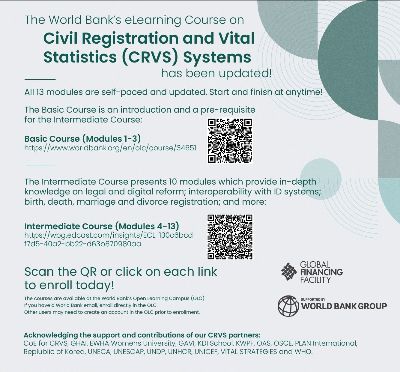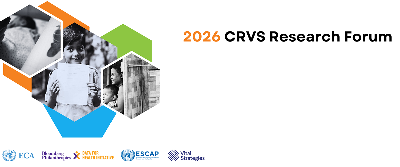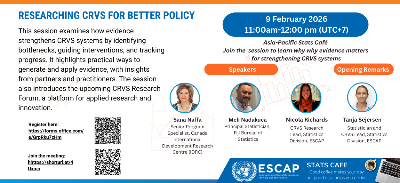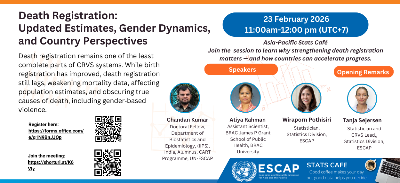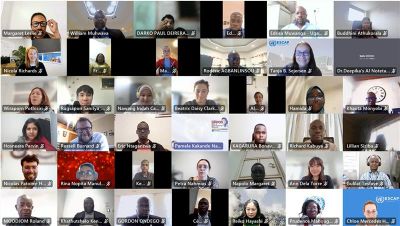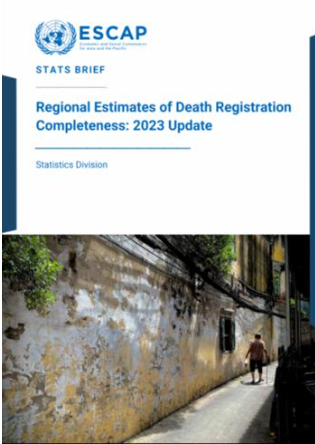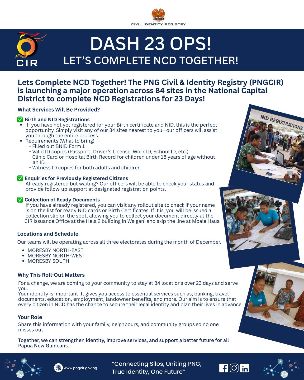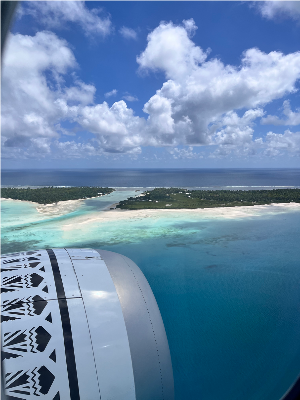|
This month, our community newsletter would like to highlight Ms. Olga Joos, a CRVS Champion who has contributed significantly to support CRVS programmes in Asia-Pacific. We asked Olga about her experiences and aspirations for Asia and the Pacific. What is your current title and role? I am currently an independent consultant engaged in the development of CRVS technical resources for the UN Population Fund (UNFPA) and the World Health Organization Regional Office for the Americas (PAHO). I am also fortunate to provide technical assistance to in-country counterparts engaged in CRVS system strengthening activities through the Data for Health initiative Global Grants Program. Until recently, I served as a Senior Technical Advisor with the CDC Foundation based in the Division of Vital Statistics at the National Center for Health Statistics, which is part of the US Center for Disease Control and Prevention. I provided technical assistance on the Bloomberg Philanthropies funded Data for Health initiative. Can you please share with us a particular experience which highlighted the importance of CRVS to you? There are just so many experiences I could possibly share, but I’ll share two. In my work supporting efforts to improve the quality of cause of death data in India, I assisted a local government in establishing a centralized mortality coding team which we trained in manual ICD-10 coding and supported with regular supervision. I recall coders mentioning challenges in coding medical certificate of cause of death forms submitted by doctors in the medicolegal death investigation system. These included deaths that are usually unnatural, suspicious, or violent and require additional examination by a doctor, usually a forensic pathologist, with additional training in forensic examinations. By listening to the coders and looking into a sample of forms, we identified the need to examine the collaboration, communication, and data flow processes between various stakeholders in the medicolegal death investigation and CRVS systems to improve the quality of cause of death. This work grew beyond India, and we were able to establish the Medicolegal Death Investigation International Community of Practice which serves as a forum to improve the quality of medicolegal death investigations from which an important public health output is cause of death data. Many deaths that are referred for medicolegal death investigation are preventable, but that is only the case if policy makers know who is dying and why. This experience highlighted the importance of CRVS as a critical source of data for action and the synergistic value of taking a holistic approach to system strengthening. My second example comes from my time working as a pediatric critical care nurse before I embarked on my career in public health. A mother whose baby had died was crying in the hallway and told her family, ‘I don’t know what tomorrow will be like.’ In a mortality register, one would see, ‘1 neonatal death’. To this mother, the loss of her baby was, and most likely still is, profound. As a public health expert, I look at issues from a population perspective, but also keep that mother’s painful comment very close to see the people and families behind each statistic. I truly believe that everyone counts and civil registration serves as the essential starting point for realizing that. How would you like to see CRVS in Asia and the Pacific develop by the end of the CRVS Decade (2024)? My short answer is to see the complete registration of live births, stillbirths, deaths, marriages, and divorces, and the complete and high-quality reporting of cause of death data. In other words, all countries in Asia and the Pacific getting everyone in the picture with a more holistic or life-course approach to CRVS. My longer answer goes a bit deeper and touches upon strategy and implementation. The establishment of the CRVS Decade has been catalytic for countries in Asia and the Pacific in supporting critical improvements to their CRVS systems with the guidance of the Regional Action Framework. To complement the broad guidance set out in the framework, countries should consider developing a CRVS National Strategy, if they don’t already have one in place. A CRVS National Strategy can align the many government stakeholders and development partners engaged in CRVS system strengthening in improving resource allocation and supporting a stepwise approach to achieving progress. Additionally, to ensure no one is left behind, countries should consider conducting an inequality assessment that can inform the CRVS strategy. These two tools are very beneficial in establishing a clear and inclusive vision to guide countries in their efforts to strengthening CRVS systems. These activities cannot just be tick boxes that are checked off once completed. Once the CRVS National Strategy is developed, it is important to translate it into action for implementation. Are roles defined by terms of reference? Do standard operating procedures clarify the processes for consistent practice and quality outputs? Are feedback mechanisms in place to refine processes and improve quality? Do stakeholders connect regularly to discuss system processes, outputs, solutions for further improvements? System maintenance is an active, not passive, process so any improvement efforts require an additional level of engagement. A mark of strong progress in getting everyone in the picture by the end of the CRVS decade would be for all countries in the region to establish active mechanisms for CRVS system strengthening guided by a CRVS National Strategy. I realize that my short and long answers are ambitious but believe that it is important to aim high (very high!) when setting goals. I commend countries in the region for the progress they have achieved thus far and am eager to see how progress continues, particularly on stillbirth, marriage, and divorce registration efforts. I also commend UNESCAP for supporting the Regional Steering Group on CRVS and its efforts in guiding countries. Stay committed and focused on getting everyone in the picture. Aim high! Which advice would you give to others trying to improve CRVS systems? Share your lessons learned and listen to those from other country stakeholders and development partners. The Regional Steering Group on CRVS, Pacific Civil Registrars Network, and South Asia Civil Registration Network are a few examples of excellent forums for lesson sharing. Also, keep copies of UN Statistics Division and World Health Organization CRVS best practice guidance documents easily accessible. Some core documents include the Principles and Recommendations for Vital Statistics Systems; Handbook on Civil Registration and Vital Statistics Systems: Management, Operation and Maintenance; and Guidelines on the Legislative Framework for Civil Registration, Vital Statistics and Identity Management. Even with my many years of supporting CRVS system improvements, I regularly review these technical documents to refresh my memory on best practices. With that, my last piece of advice is to always be open to learning. There is always so much to learn, regardless of one’s experience or familiarity with global best practices. |

More News
India is hosting a National Symposium and Stakeholder Consultation titled “Building a Mortality…
The World Bank has released an updated version of its free Civil Registration and Vital Statistics…
In partnership with the Economic Commission for Africa (ECA) and Vital Strategies, the Economic and…
ESCAP is hosting a new session of its Asia‑Pacific Stats Café Series on 9 February 2026, focusing…
ESCAP will convene another session of the Asia‑Pacific Stats Café Series on 23 February 2026,…
On 20 January 2026, the third cohort of the CRVS Applied Research Training (CART) Initiative was…
ESCAP has released a new Stats Brief on Regional estimates of death registration completeness: 2023…
The Papua New Guinea Civil and Identity Registry (PNGCIR) has initiated DASH 23 OPS, an intensive…
Vietnam has approved a new National Action Program on Civil Registration and Vital Statistics (CRVS…
In the Solomon Islands, where nearly 80% of deaths occur outside formal health facilities, the…



